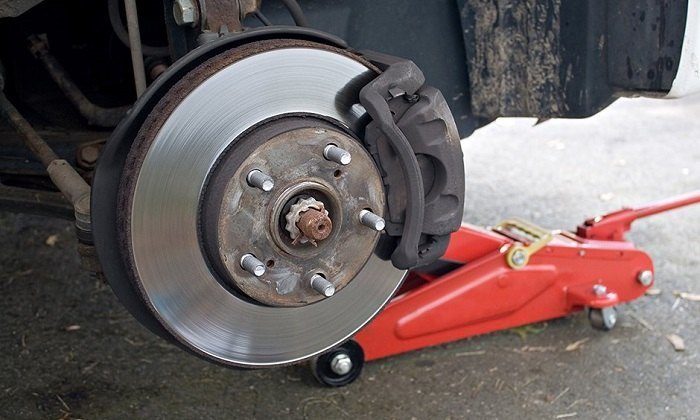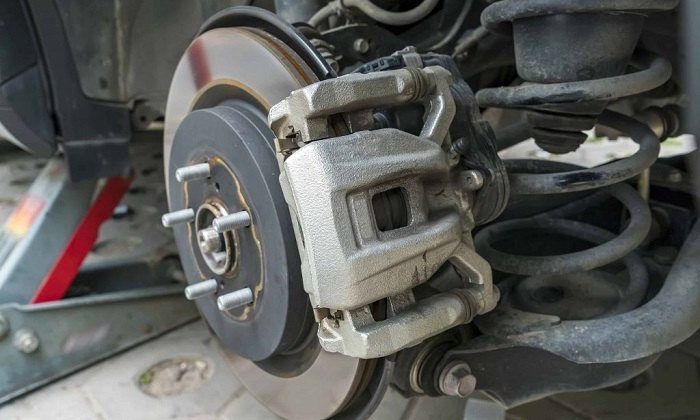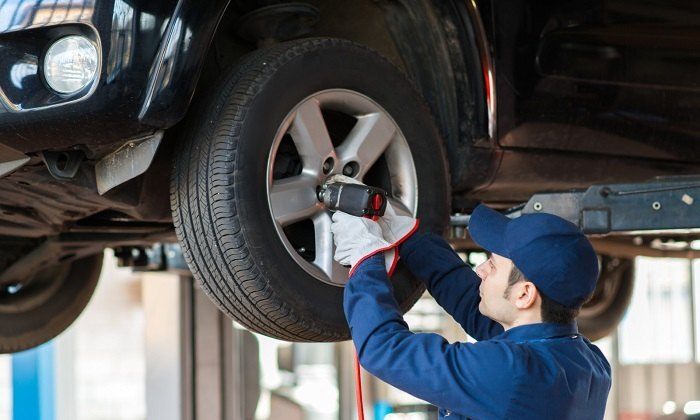by Joshua Thomas
Wheel bearings will come in different shapes and sizes, but regardless of what they look like, the fact is that they are essential for the wheels to move properly. Hence, when what you have on your vehicle wears out, you need to replace them as soon as possible.
In some cases, it will only be the front or rear bearings that need replacement while in others all will need to be replaced.
But, the most important thing is to know how much you are likely to spend on the job to ensure you are prepared when it is time to change the bearings and do not have to procrastinate.
Below we provide an overview of everything you need to know about wheel bearing replacement starting with the symptoms to watch out for to know when you have bad ones.
Contents

Before you get to replace your wheel bearings, you will first need to identify when they have issues and hence the need to replace them.
In some instances, problematic bearings might be very evident as the vehicle will not drive well, but in others, it is hard to tell. However, here are a few reliable symptoms to look out for.
Loud grinding noise from any part of the vehicle is often an indication that two metal parts are rubbing against each other aggressively. When this grinding noise comes from your wheels, there is a high likelihood that you have worn out bearings.
The grinding noise will occur when the bearings lose their lubricity, and hence build up a lot of heat as the metal components that they are made up of grind against each other.
This noise will often be clearer when you are shifting gears or when you are making a turn and will seem to come from one when given that worn-out bearings also result in uneven wheel wear.
As the wheel bearing worsens, your steering wheel can also start vibrating. The vibration will be noticeable as you start driving at low speeds and seems to get worse as you accelerate.
And while it is easy for many people to assume that the vibrations result from unbalanced tires since the symptoms for both issues are quite similar, problematic bearings will cause steering vibrations at any driving speed.
If you notice that your wheels wobble excessively or have more play than usual, this can be a sign that you have bad bearings and need to replace them.
However, this symptom is not easy to diagnose as you need to have your vehicle suspended on a hydraulic lift and move the wheels back and forth with your hands to see whether they wobble excessively or not.
When your bearings are in good shape, your wheels should have little to no wobble at all as keeping the wheels sturdy is one of their main functions.
Different things can cause your vehicle to pull to one side, but in many instances, it will often be as a result of an issue with the wheels, and the bearings are more often than not the source of the problem.
When your bearings are worn out, the smooth lining that they require to function optimally will not be there, and this causes excessive tire vibrations, which then makes the vehicle pull to one side when driving.
With worn bearings, you can experience the vehicle pulling to one side when braking as the bad bearing will cause excessive runout. But, also keep in mind car side pulling as you are braking is often a result of bad brake calipers and rotors.

Different things can cause bad wheel bearings, and it can happen even when you give your vehicle the best care.
The most obvious cause of bad bearing is natural wear and tear because these are one of those vehicle components that take a lot of abuse every time you are driving your vehicle.
Also, any accidental impact where the bearings take a significant hit can damage them and make it necessary to replace them. In many instances, wheel bearings will get damaged when you hit a pothole or curb.
Infiltration of moisture into the interior components of the bearings can also damage them as it will cause rust and corrosion.
How long the wheel bearing on your vehicle last will depend on various factors such as your typical driving conditions and also the specific type of bearings you have.
For those that drive in wet and moist conditions a lot, the bearings are likely to get moisture infiltration and rust out relatively faster. Also if you drive your vehicle a lot, you will have to pay for new ones sooner than motorists that drive their cars occasionally.
If you are using the top-quality factory-grade wheel bearings, it will not be unusual for them to last up to 150,000 miles, which means you might not even need to change them for the time you have the vehicle.
However, if your vehicle is exposed to extreme environments such as heavy snow or heat, you will need to replace bearings every few thousand miles as they will not last very long.

Different factors like the type of bearing that your vehicle uses and also where you are getting the service from will have a huge impact on how much you end up paying to have your wheel bearings replaced.
But, to give you some idea on how much you are likely to spend, here is a breakdown of the average bearing replacements costs for the different kinds of wheel bearing in most vehicles.
| Wheel Bearing | Budget |
|---|---|
| Front Wheel Bearing | $250 - $500 |
| Rear Wheel Bearing | $100 - $460 |
| Hub Bearing | $400 - $800 |
| Front & Rear Bearing | $800 - $1000 |
The front wheel bearings are made to last a long time, and they will be connected to the vehicle's drive axle components and built into the knuckle arm assembly on the steering.
These front bearings often cost more to replace than the rear ones. If you want to replace both sides, you will pay anywhere between $250 and $500. But, if you plan to do it yourself and hence do not have to pay for any labor cost, you can spend as little as $120 on the required parts.
A rear wheel bearing will often cost significantly less to replace when compared to the front bearing.
Unfortunately, for most vehicles, the rear bearings will not last as much as the front ones, and will hence need more frequent replacement, which makes them more expensive to replace in the long run.
If you are an avid DIYer or have moderate mechanic skills and can do the job yourself, you can spend as little as $100 or less for parts for both sides. But, if you have to pay a professional mechanic for the job, it will cost between $240 and $460 for both sides.
Many vehicle models will also include a rear hub bearing, and for this kind of assembly, the wheel bearing will attach with the hub assembly. And if the car has an ABS, the setup will also include a speed sensor.
But, in many instances, you will need to replace the entire hub assembly, and not just the wheel bearing, which makes this more expensive.
Because the cost of parts will depend on how complicated the assembly is, you can expect to spend anywhere from $400 to $800 or even more for both sides.
On the rare occasion that you need to replace all the wheel bearings in your vehicle such as after an accident, on average you will spend less more money compared to replacing the front or rear wheel bearings individually.
Unless your insurance covers the bill, you can expect to part with between $800 and $1,000 to replace all the bearings depending on the vehicle model and where you are getting the service.
1. If your vehicle has more than 100,000 miles, it will be wiser to replace both driver and passenger side bearings even if one does not look worn out.
2. Also, bearing noise is easy to confuse with defective tire noise, and so for an accurate diagnosis, it will be smarter to have the wheels checked by a professional mechanic.
3. Labor cost makes up a huge chunk of the wheel bearing replacement cost as for most vehicle models, it will be anywhere from $100 to $300 in many places.
While routine maintenance is often enough to ensure your wheel bearings remain in good working condition, sometimes it will be necessary to replace them.
When you have to replace the bearing whether it is the front or rear, you need to make sure you get the best value for your money. And this does not necessarily mean getting the cheapest service but rather the best job.
Depending on the bearing you are replacing and whether you are doing it yourself or using the services of a professional mechanic, you can expect to spend anywhere from $100 to $1,000 on the job. Also, keep in mind that the cost of replacing your wheel bearings will largely depend on the vehicle type and model that you drive.
 |
 |
 |
 |

About Joshua Thomas
Joshua Thomas just simply loves cars and willing to work on them whenever there's chance... sometimes for free.
He started CarCareTotal back in 2017 from the advices of total strangers who witnessed his amazing skills in car repairs here and there.
His goal with this creation is to help car owners better learn how to maintain and repair their cars; as such, the site would cover alot of areas: troubleshooting, product recommendations, tips & tricks.
Joshua received Bachelor of Science in Mechanical Engineering at San Diego State University.
Just Car Care